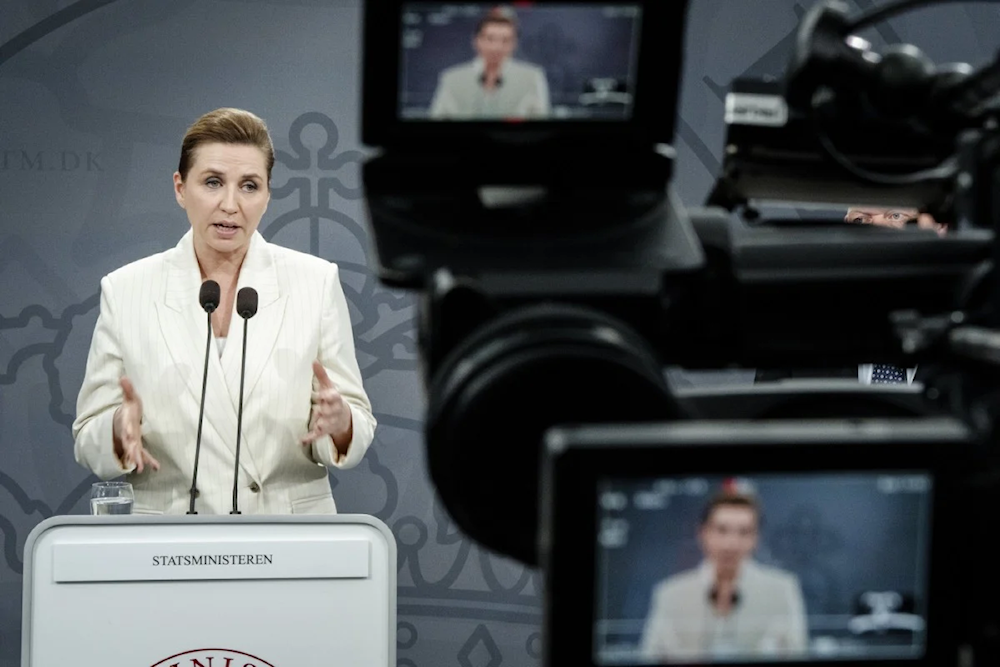Denmark seeks niqab ban, removal of school prayer rooms
Denmark’s Prime Minister Mette Frederiksen proposes extending the public niqab ban to schools and eliminating campus prayer rooms, citing concerns over religious pressure and women’s rights.
-

Denmark’s Prime Minister Mette Frederiksen at a press conference, June 5, 2025. (AFP)
Denmark’s Prime Minister Mette Frederiksen is calling for expanded restrictions on Islamic practices in public institutions, including a proposal to extend the country's public niqab ban to educational settings and eliminate prayer rooms in schools and universities.
The 2018 law does not extend the ban to schools, and only prohibits full-face coverings such as the niqab and burqa in public spaces, but does not include classrooms or campus areas. Frederiksen now claims that this legal gap allows for continued religious pressure and social control over Muslim women in educational environments.
“There are gaps in the legislation that allow Muslim social control and oppression of women at educational institutions in Denmark,” Frederiksen told Danish news agency Ritzau on Thursday.
The proposed measures include not only extending the veil ban into schools but also removing designated prayer rooms on campuses. Frederiksen framed the initiative as a necessary step to reinforce 'democratic values' and 'protect students' from coercive religious environments.
“You have the right to be a person of faith and practice your religion, but democracy takes precedence,” she said. “When you’re at school, you’re there to get your education.”
Frederiksen added that while prayer rooms may appear inclusive in theory, they “provide a breeding ground for discrimination and pressure” in practice. Education ministers are expected to coordinate with universities to implement the changes.
This initiative was prompted in part by recommendations from the Commission for the Forgotten Women’s Struggle. The commission previously urged the Danish government to extend the ban and even proposed banning hijabs in primary schools, a plan that was later dropped in 2023 following public protests.
Proposed removal of prayer rooms in schools and universities
The prayer room removal plan is being framed as a move to create religious neutrality in public education, but has already drawn sharp criticism from civil liberties advocates.
Frederiksen's comments reflect a growing trend in European politics where governments are tightening restrictions on Islamic attire.
Under Denmark’s current veil ban, wearing a niqab or burqa in public can result in a 1,000 kroner ($154) fine for the first offense, increasing to 10,000 kroner for repeated violations.
The latest proposal is likely to reignite debates around religious freedom and human rights. Amnesty International has previously labeled Denmark’s 2018 legislation a “discriminatory violation of women’s rights,” arguing that such laws disproportionately target Muslim women under the guise of gender equality and security.
Bans on face coverings have become more widespread in Europe since France introduced the first such national measure in 2011.
Similar bans have since been enacted in Austria, Belgium, Bulgaria, Italy, the Netherlands, and parts of Germany and Spain.
Frederiksen’s government has not yet submitted formal legislation on the school-focused ban, but her remarks mark a clear policy shift toward stricter enforcement of secular norms in public education.
As Denmark moves closer to expanding its niqab ban and eliminating school prayer rooms, debates around inclusion, freedom of religion, and the balance between democratic values and cultural expression continue to intensify across the European Union.

 3 Min Read
3 Min Read








